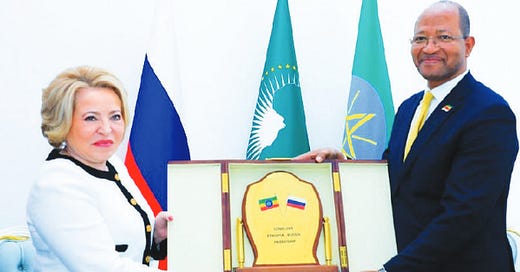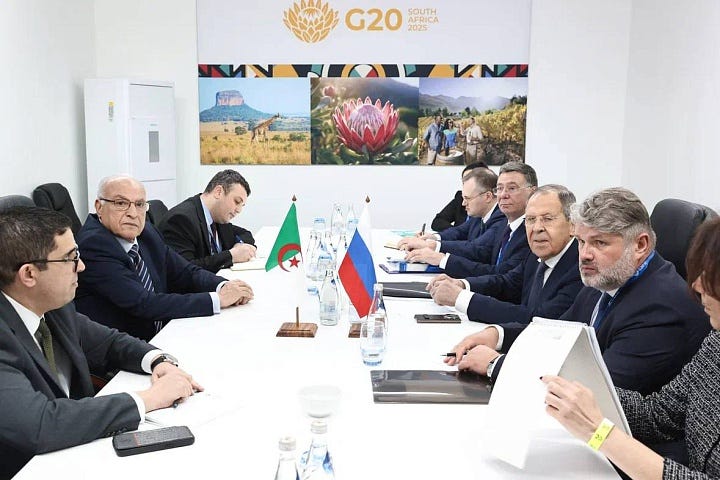The Week’s Top Five Links
Tadeusz Brzozowski, “Africa fears that after the war with Ukraine, Putin will strengthen the mercenary forces with criminals,” Polska Agencja Prasowa, 17 February 2025 [in Polish].
Caroline Loyer, “Sudan: How Russia Extends its Influence,” BFM TV, 18 February 2025 [in French].
Rachel Chanson, “Extremists, Russian Expansion in Africa’s Sahel Threaten World Order,” Washington Post, 19 February 2025 [soft paywall].
Sara Leykin (ed.), “Russia’s Evolving Footprint in the MENA Region,” Italian Institute for International Political Studies, 20 February 2025.
Khanyisile Ngcobo, “South Africa invites Ukraine's Zelensky for state visit,” BBC, 21 February 2025.
Cover photo: The Ethiopian Herald, 20 February (link).
The Week in Analysis
Valentina Matviyenko, Speaker of the Russian Federation Council, visited Ethiopia this week. Her visit included the inauguration of Sputnik’s editorial centre in Addis Ababa. The centre will feature cross-media content in Amharic and English. In turn, Matviyenko met her counterpart, the Speaker of the Ethiopian House of Federation, Agegnehu Teshager. More interesting still was a meeting with the all-powerful Ethiopian Prime Minister Abiy Ahmed. According to Russian sources, the Russian side featured the ministers of economic development and health, officials from the Ministry of Finance, the Russian Academy of Sciences, and of state-owned Rosatom. During the meeting, Abiy said that he, or Ethiopian President Taye Atske Selassie, would attend the 9 May parade in Moscow. As part of the Sputnik opening, Matviyenko gave an interview to Sputnik, stating that the countries of Africa should seek from the West compensation over ‘their crimes’.
During the Johannesburg G20 meeting, discord prevailed, with the traditional ‘family photo’ cancelled. But discord did not prevent a one-on-one meeting between Russian foreign minister Sergey Lavrov and South African President Cyril Ramaphosa. This was expected, even a matter of courtesy given that South Africa is the host of the summit. That said, the meeting comes at a tense moment in US-South Africa relations. Going from the Lady R shambles of 2023 to Trump’s belligerence and Secretary of State Marco Rubio’s snub of the G20, Pretoria is seeking partners to cope with US pressure. So, Pretoria must walk a fine line between appeasing the US, hedging with Moscow, and reaching out to other partners abroad, including the EU. According to the information available, the Lavrov-Ramaphosa discussion included a briefing on the US-Russia Riyadh discussion. The Riyadh meeting, officially meant to discuss bilateral relations, had a global component as the two parties sought to find areas of ‘mutual geopolitical interest’. (Read more about the meeting at the Russia-Africa Digest.)
Detail: in parallel, on 21 February, deputy foreign minister Sergey Ryabkov held a meeting with BRICS representatives in Moscow to brief them on the Riyadh talks.
Russia engages in more conflict diplomacy. In addition to meeting Ramaphosa, Lavrov held meetings at the G20 with other representatives attending, among others, the Algerians. According to the Russian press release, the 20 February meeting addressed bilateral and regional issues, including the conflict-afflicted Sahel region. As reported in several RAM editions, relations between Algiers and Moscow have oscillated and now may have entered an upswing. Russia’s military presence in the Sahel has been an irritant for Algeria as the country’s once formidable Sahel influence now is limited. This week also featured other Russian meetings with African counterparts to discuss other conflicts. So, the Russian Special Representative Mikhail Bogdanov met on 17 February with the ambassador of Sudan to Russia, Mohammed Elghazali, to discuss that country’s civil war. Then, on 21 February, Bogdanov met the Egyptian ambassador to Russia, Nazih El-Nagari, to discuss the ‘current situation in the Middle East’, presumably a reference to Israel, Syria, Sudan or Libya, or all of them.
Detail: this week, Bogdanov also met the Equatoguinean ambassador in Moscow to discuss the bilateral agenda and to coordinate on African issues.
Russia-Algeria meeting at the 2025 G20. Source: mid ru
Chadian President Idriss Deby visits Burkina Faso. Taking place on 22 February, this was Deby’s first visit to Ouagadougou as President. The visit involved a meeting between Deby and junta leader Ibrahim Traore, and the establishment of a commission to address bilateral relations. The context of the visit is intriguing, as Chad recently joined the West African trend of reducing defence cooperation with France and closing down base-sharing deals with Paris. In turn, hesitant contacts have taken place between N’Djamena and Moscow, though the former remains cautious about engaging Moscow in any security sphere. That said, Chad has increased its relations with the coalition of central Sahel juntas (known as the AES), which are all engaged in intensive defence cooperation with Russia and Afrika Corps. So, it is no surprise that Deby’s visit attracted the attention of Russian state-controlled media. The motive for the visit was officially to attend… a film festival.
After teasing the opening of six new embassies in Africa for months, Lavrov finally puts a date: 2026. The countries are Comoros, Gambia, Liberia, Niger, Sierra Leone, South Sudan and Togo. It was only on 19 February that Lavrov specified that the embassies will open by 2026. This was mentioned during his speech at the Russian Duma.
A book to look out for is John Lechner’s upcoming Death is Our Business, a journalistic account of the evolving world of private military companies. Last year, the esteemed Africa Intelligence (a common source of RAM), published a positive review of the book, stating that the book ‘exposes the inner workings of Wagner’. More intriguing still is what Lechner writes about Sudan. According to early reviews, the book will feature new details of Wagner’s activities in that country. There, the group’s role in business and mining is better known, but their political activities remain a mystery. Lechner, a friend of the newsletter and a prolific journalist has unparalleled knowledge of the topic and excellent access to primary sources, including ex-Wagner personnel, so among the Wagner literature this one will stand out. Expect a review in the future at the Russia-Africa Digest.
How do you like the new format of the Russia-Africa Monitor? Are there any stories you would have wanted to see covered this week? Please, leave a comment with your thoughts!



Hi Ivan, congrats for the Digest, very informative and timely.
You may be interested in this recent publication by Carpo https://www.linkedin.com/posts/carpo-%E2%80%93-center-for-applied-research-in-partnership-with-the-orient-e-v_addressing-russias-search-for-new-strongholds-activity-7297532260549820416-SiLU?utm_medium=ios_app&rcm=ACoAAAKKYkMBiNoRLtu-9GFQln28femy18ofHwA&utm_source=social_share_send&utm_campaign=share_via